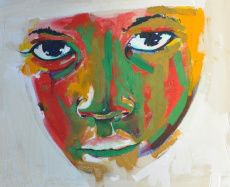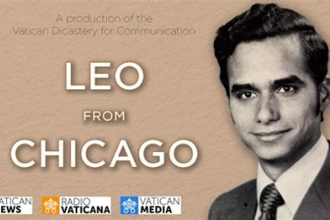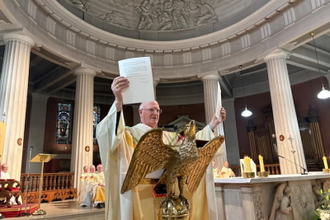Southwark J&P focus on human trafficking, modern slavery

Image by Luke Teague
Southwark Diocese Commission for Justice, Peace and the Integrity of Creation held its Autumn Assembly on Saturday 12 October. The title was: 'Reducing the Risk of Human Trafficking and Modern Slavery.'
Fr Mark Odion a diocesan priest seconded to the Santa Marta Group of the Bishops' Conference described how, in December 2011, Bishop Pat Lynch had organised a seminar on behalf of the Bishops' Conference to raise awareness of the impact of trafficking in the UK and elsewhere. Attendees included senior police officers, representatives of religious orders (who were doing excellent outreach work with victims), embassy staff, ethnic chaplaincies, dioceses and people from a wide variety of different organisations.
This opened the eyes of many to the scale of the problem and the need to find ways of addressing this worldwide problem. In 2014, at the Pope's request, Cardinal Vincent Nichols followed up this pioneering work by inviting bishops and police chiefs worldwide to meet at Casa Santa Marta to discuss human trafficking and modern slavery.
Since then 35 national 'Santa Marta' groups have been working as state/church alliances to strive to end modern slavery.
The 2000 UN Convention against Internationally Organised Crime defines trafficking using words such as "the recruitment, transportation, transfer, harbouring or receipt of persons, by means of the threat or use of force or other forms of coercion, of abduction, of fraud, of deception, of the abuse of power or of a position of vulnerability or of the giving or receiving of payments or benefits to achieve the consent of a person having control over another person, for the purpose of exploitation". And exploitation includes, at a minimum, "the prostitution of others or other forms of sexual exploitation, forced labour or services, slavery or practices similar to slavery, servitude or the removal of organs." Human beings, victims of trafficking or modern slavery, are manipulated and controlled, contrary to the principles of Church Teaching.
More than 40 million people are victims of modern slavery globally, and annual profits generated from trafficking in human beings are as high as $32 billion. (Among illegal crimes, trafficking is surpassed in profit only by illegal trade in arms.) It is a serious crime that includes exploiting people for little or no pay - an exploitation that can include forced labour, sexual exploitation, domestic servitude, forced criminality, organ harvesting and more.
An enslaved person is forced to work against their will; is owned or controlled by an exploiter or 'employer'; has limited freedom of movement; or is dehumanised, treated as a commodity or has been bought and sold as property. There are over 40 million enslaved worldwide, a quarter of them children. There are 136,000 victims in the UK, with the top three source countries being the UK, Albania and Vietnam. (Yes, the UK is the top source.) Trafficking involves the recruitment, transfer or obtaining of an individual through coercion, abduction, fraud or force to exploit them in activities such as forced labour, forced marriage or commercial sex work. The exploiter may be anyone: strangers, neighbours or family members. Most people are trafficked within their own countries - including within the UK.
We next heard from Sharon Benning Prince of the Medaille Trust, a UK organisation which exists to provide refuge and freedom to victims of modern slavery, supporting them as they rebuild their lives. It was started in 2006 by a group of friends from religious congregations with a house for women trafficked into prostitution. It quickly grew into a national network supporting women, men and families trapped in modern slavery and is now the UK's largest provider of supported safe house beds for victims.
Victims are often vulnerable and unable to find work. They might pay smugglers to safely take them to a different location. But they have no money and traffickers offer a guaranteed job and the chance to build a new life for free, they jump at the chance. The promised job is a lie and they are forced to work long hours in hard and degrading conditions with little or no pay. The threat of violence - to themselves or their families - traps them further.
We probably meet victims in our communities. Slavery no longer involves people bound in chains: modern slaves are domestic and construction workers or staff in nail bars and brothels, car washes and fruit pickers. UK referrals almost doubled between 2017 and 2018, including an almost 50% rise in the number of children. The increases were driven by labour exploitation, including youngsters exploited for criminal purposes by 'County Lines' drug gangs. More than half of Britain's slaves are male and over 40% are children.
They work long hours in harsh or unsafe conditions and typically live in dirty, cramped or overcrowded accommodation, perhaps at their workplace. They often appear frightened, withdrawn or show signs of physical or psychological abuse and are rarely allowed to move around freely on their own, appearing to be under someone else's control. They are probably frightened to engage in conversation, avoiding eye contact and refusing to seek help, likely to be watched by someone who controls them and who "looks after" documents such as passports.
Nick Hanrahan from the UK branch of the Jesuit Refugee Service explained their mission to accompany, serve and advocate for the rights of refugees and other forcibly displaced persons. In the UK JRS has a special ministry to those who become destitute as a consequence of government policies and those detained for the administration of immigration procedures. It works in a spirit of mutual respect, dignity and solidarity with the refugees and forced migrants who have no right to work, and collaborates with other organisations.
There is a small team of staff and a larger number of volunteers. Their premises in East London offer not only food, shelter and occasional items of clothing, but various other forms of assistance and accompaniment to help people retain their dignity and sense of identity, providing them with opportunities to make choices and find positive ways to use their time and talents. These include peer support groups for men and women, creative writing and photography workshops for self-expression. Exiles may need help to find places to live and assistance with legal advice and interviews, with filling in forms and adapting to the customs of UK life. But JRS also appreciates the need to help people view their life from a spiritual perspective and join together in prayer.
A particular ministry is to those detained indefinitely as part of the asylum process. Detainees struggle with isolation, not knowing how long they will stay locked up and in fear of sudden deportation. Visitors can help them cope with anxiety and emotional strain and provide practical help with mobile phone top-ups and in liaising with solicitors; with securing referrals to specialist services for their, and keeping in touch with family and friends.
Marine Harrington, one of CAFOD's community participation organisers for Southwark led us in an exercise to deduce what factors make people vulnerable. These include shortages of food and water, perhaps due to extreme weather events or to a lack of money; high unemployment; discrimination, poor education; inadequate health care, and more. Much of CAFOD's work addresses the causes of such problems as well as their symptoms.
A high proportion of those trafficked are from Nigeria - from Edo State in particular, which is home to numerous Catholics. Looking back to the work of the Santa Marta Group, Southwark diocese has helped Bishop Pat and Father Mark to work alongside the Archdiocese of Benin to enable a Human Awareness programme, to prevent young people falling victim, as well as a Human Livelihood programme, working to provide local work opportunities and training.
All the excellent organisations who provided our speakers need prayers and help - not just by donations of money and goods, but by spreading the word about their challenges and by volunteering and giving time to help. You can find out more at their websites:
LINKS
Santa Marta Group - http://santamartagroup.com/
Santa Marta Group resources - http://santamartagroup.com/resources/
Medaille Trust - www.medaille-trust.org.uk/
Medaille Trust Resources: www.medaille-trust.org.uk/resources/our-resources/?/what-we-do/resources
Jesuit Refugee Services (JRS) - www.jrsuk.net/
JRS resources: www.jrsuk.net/what-can-i-do/
CAFOD - https://cafod.org.uk/
CAFOD resources: https://cafod.org.uk/Volunteer/Volunteer-resources


















